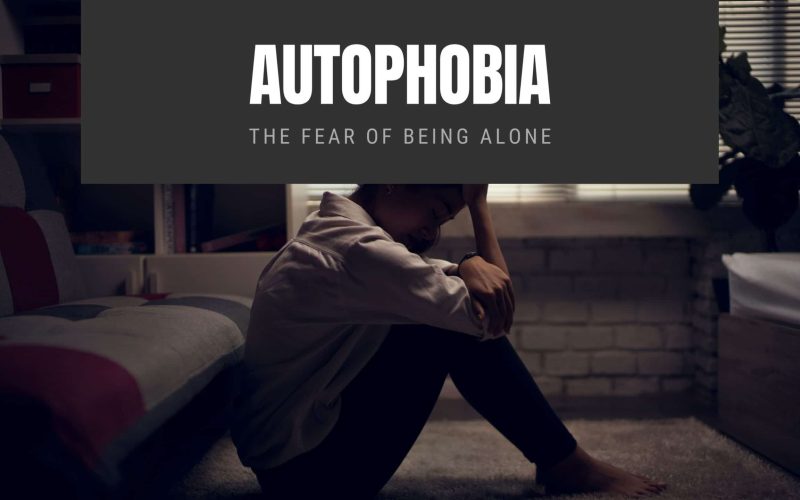Have you ever woken up after a wild night out with friends, and before you can even get the chance to discuss last night’s events, you suddenly feel afraid, alone, scared, and angry? You suddenly start feeling like everyone is gone, and you are suddenly alone.
Suddenly, it doesn’t matter that you just had a beautiful evening with your friends or have great people in your life; all that comes to your mind is how alone and scared you are.
If this is what you are feeling, have felt, or feel constantly, then you are experiencing what is known as autophobia.
Autophobia, in simple terms, means the fear of being alone. Autophobia can also be referred to as monophobia.
Autophobia is an anxiety disorder that is often triggered when you are alone or have the thought of being alone.
It is one of the many specific phobias that we have, and guess what? You are not the only person who feels like this. Autophobia is a pretty common disorder that psychologists deal with.
Just like most anxiety disorders, autophobia can result in you experiencing certain physical and psychological symptoms.
If left untreated, this disorder can cause distress and leave negative footprints and impacts on the life of the patient.
One of the keys to treating autophobia, as well as helping those who are experiencing it, is to know and understand this disorder.
This article will help you understand what you are dealing with, the key signs and symptoms you will experience, how to manage your condition, and the treatments available. So, let’s dive right in, shall we?
What is Autophobia?
As earlier stated, autophobia (also known as monophobia, isolophobia, or eremolophobia) is the intense irrational fear of being left alone, being in isolation, or being ignored.
According to research, although most people experience this fear when they are alone, in some specific cases, some people don’t even need to be left alone before they start having panic attacks.
The thought or the mere mention of being alone scares them more than anything, and once they start having these thoughts, they can begin to panic. This phobia is often called a specific phobia.
Specific phobias are those type of phobias or anxiety disorders that involves the irrational, excessive, and persistent fear of a particular situation, object, or condition even though it is in a perfect state.
Most people who have specific phobias end up avoiding the situations or the things they are afraid of.
In cases beyond their control (i.e., in conditions in which they can’t avoid their fear), they end up experiencing intense anxiety, which can lead to full-blown panic attacks.
For people who may have autophobia, the thought of spending time alone, sitting alone, sleeping alone, or generally just being isolated can force them to experience panic attacks.
The term autophobia comes from two words: auto (meaning self or alone) and phobia(meaning fear). Going by the literal sense of the word, autophobia means the fear of self; that is, when people are afraid of themselves.
However, this is not what this condition refers to in the medical aspect. Autophobia is a mental condition that results from the fear of spending time alone.
Is There a Difference Between Autophobia and Loneliness?
Yes, autophobia and loneliness are absolutely two different conditions.
People can be said to be lonely or experience loneliness when they lack social interaction or don’t have enough meaningful relationships.
It is possible for people who experience loneliness to be in a room full of people but feel alone and lonely.
Some people end up feeling sad because they are lonely. Their feelings are completely rational and very different from what people who have autophobia will feel.
On the other hand, autophobia is the irrational sense and feeling of severe anxiety, which is often triggered by the thought or idea of being alone.
Autophobia can also be triggered as a result of being without or the thought of not being by the side of “that one person.”
This person (although they may not know it) can affect the patient’s ability to carry out day-to-day activities.
For example, some people can’t function without seeing their favorite family members. If they think about not being close to that family member, they may experience panic attacks.
If this occurs, that person can also be said to experience autophobia.
Causes
Just like other specific phobias, the exact cause of autophobia is unknown. However, experts have attributed the development of this anxiety disorder to two main factors:
1. Environment
Mostly, when an event occurs in the patient’s childhood that forces the child to feel alone, that child may carry that experience into adulthood and develop autophobia.
For example, suppose the child’s parents are involved in a brutal divorce, and the child sees the parent (especially his or her favorite parent) walk away.
In that case, the child can begin to feel abandoned and later go on to develop autophobia.
Also, if one or both parents of the child die, the child, who may not understand things properly at the time of the incident, may begin to feel left alone and abandoned. If this is not properly corrected, the child may grow up developing autophobia.
In some rare cases, a child may develop a feeling of abandonment if he or she is forced to go through a particular trauma alone. This may result in the development of autophobia.
2. Genetics
Most people who have had parents, siblings, or other family members who have developed any form of anxiety disorder can go on to develop any phobia, including autophobia.
Some experts have attributed autophobia to being a part of a larger panic disorder (or borderline personality disorder), where certain factors such as the inability to self-soothe and the feelings of fear of abandonment are contributing to this disorder.
What Are the Conditions That Are Related to Autophobia That Can Trigger This Disorder?
As earlier stated, autophobia can be developed as a result of the existence of other anxiety disorders. For example, people who have experienced panic attacks can develop autophobia.
This is because they may begin to dread being alone, especially when they have an episode of panic attacks. This can lead to the ultimate fear of ever being alone.
Autophobia also has been linked to another anxiety disorder, which is known as agoraphobia. Agoraphobia is the intense fear of being absolutely unable to escape from a particular situation or place.
Sometimes, autophobia has been seen to be a symptom of agoraphobia. Most people who have agoraphobia often fear that when caught up in situations, they can’t escape it without being helped by someone. So they begin to fear being alone, leading to autophobia.
Most people who have agoraphobia often dread moving on public transport or walking in crowded places where they have little or no control over the outcome of any situation that may arise in such places.
Agoraphobia has been seen to reduce a person’s self-worth and self-esteem. It has also been seen to impair a person’s ability to complete tasks independently.
Some researchers have also attempted to link autophobia with borderline disorders. However, there are no current studies that support that idea.
Symptoms of Autophobia
Most people who have autophobia feel unsafe when they are alone or on their own. Sometimes, they begin to speak of impending doom and may find breathing hard.
Autophobia can cause a person to become very anxious at the mere thought of being alone or at the prospect of spending time out alone in the room while everyone else is in another room.
Another common symptom with people who have autophobia is that they think that their loved ones will leave or abandon them soon.
This is particularly common with those who have lost a parent, both parents or a loved family member at one point in their lives (especially in childhood).
However, if this is the only symptom the patient is experiencing, it may not mean full-blown autophobia yet.
The patient may just be experiencing separation disorder, which can also be experienced in autophobia.
People who have autophobia will experience the following symptoms:
- The sense of impending doom when left alone
- Feelings of being in danger and unsafe
- Fear of an intruder breaking in to cause them harm
- Feelings of overwhelming anxiety when left alone
- Inability to breathe
- Feelings of fainting.
- Thoughts of death may occur to them.
- Inability to think correctly or process things thoroughly when kept alone.
- They are often compelled to run and always find company.
- Increased heart rates, rapid breathing rate, and racing pulse rates
- Some people may begin to feel sick and feel faint
- Severe sweating
- Intense shaking.
People who experience autophobia may be seen doing the following:
- Going to extreme lengths in order not to be alone
- Always trying to find a company as soon as one party leaves them alone
- We always find excuses for someone to stay and not leave, even when it is impractical and they do not need to stay.
- Always showing a lack of independence and always being clingy in relationships.
Can autophobia influence your relationship?
If you are in a romantic relationship, due to your fear of being alone, you might find yourself compromising and “just going along with the flow” even when you are not favored.
You may be with someone who doesn’t respect and treats you poorly simply because you don’t want to be alone.
According to Dr. Chloe Carmichael, Ph.D., a clinical psychologist in Manhattan, irrational fear can lead you to rush into relationships with someone who probably doesn’t like you that much, which explains why most relationships don’t last.
Also, according to Dr. Chloe, autophobia can mess up the relationship that you are supposed to have with yourself. You need to enjoy spending time with you.
However, you might spiral into catastrophic thinking when you feel something will happen to you or have negative thoughts about yourself.
You must stop thinking that you will always be alone or end up alone. Remember, technically, we all remain single until we meet our partners, and you will surely meet yours.
How Can I Be Diagnosed With Having Autophobia?
Anyone who is experiencing autophobia or thinks he or she has autophobia should talk to their doctor about it.
Once your doctor has physically accessed you and ruled out other possibilities, you may be referred to a mental health specialist.
Your mental health specialist will ask you a series of questions about your behavior and feelings, as well as your fears.
Your answers to these questions will help them evaluate you and your state of mind. This evaluation will help them to diagnose any mental condition that may be affecting you properly.
For you to be diagnosed with autophobia means that your fears and symptoms are severe enough to interfere with your everyday life and activities.
What Are My Treatment Options?
Just like other phobias, autophobia has a wide range of treatment options. However, most of these treatments can be classified into the following;
1. Cognitive Behavioral Therapy (CBT)
Cognitive Behavioural Therapy, also known as CBT, is a type of therapy session that offers people with different kinds of phobias, including Autophobia, practical ways how to deal with their fears.
Since autophobia has to deal with the fear of spending time alone, CBT will offer you practical measures you can carry out to help you cope with spending time with yourself.
According to the National Institute of Mental Health, about 75% of people who have dealt th with specific phobias were able to overcome their fears using Cognitive Behavioural Therapy.
2. Exposure Therapy
Exposure therapy is usually classified as a form of CBT. According to research conducted by experts at the University of Exeter, United Kingdom, exposure therapy has been used to help break the cycle of avoidance that is often associated with people who have specific phobias.
Since autophobia deals with the fear of being alone, people who have this fear tend to avoid spending time with themselves.
Every time these people avoid spending time alone, their brain registers it as anxiety; therefore, their anxiety levels increase anytime they avoid spending time with themselves.
What exposure therapy seeks to do is to expose these people to their fear but in a controlled manner.
By exposing them to their fears repeatedly, people who have autophobia can break this vicious cycle and also increase their adaptability and tolerance for staying alone.
3. Use of Medications
Sometimes, if psychotherapy isn’t working or it isn’t functional as it should, then your doctor may prescribe the use of certain medications. Some of these medications include:
Beta-blockers
Beta-blockers function by effectively blocking the effects of adrenaline, which is often released when a person is anxious or scared. This adrenaline causes one to want to run when confronted with one’s fears.
When beta-blockers block the secretion of adrenaline, you will have a fighting chance to realize that your fears are just fears.
Benzodiazepines
Benzodiazepines are basically sedative drugs. These sedative drugs are very effective in treating anxiety and panic attacks. However, it is only in extreme cases that your doctor may prescribe these drugs to you.
This is because these drugs, although very effective, can be quite addictive if used without control.
Outlook
When autophobia is treated, people can manage themselves very well. It is safe to say that the outlook of this condition is promising and positive.
In other words, once a person has recognized that he or she has autophobia, they meet their doctor for treatment, and they properly go through with their therapy and drugs, then their condition will improve.
Over time, after using the right treatment plan, these patients will find that the fear they normally experience when they stay alone will either reduce significantly or disappear entirely. As such, a person can enjoy his or her alone time again.
Sources;
- What you need to know about Autophobia; Medicalnewstoday
- Your fear of being alone: Womenshealth





